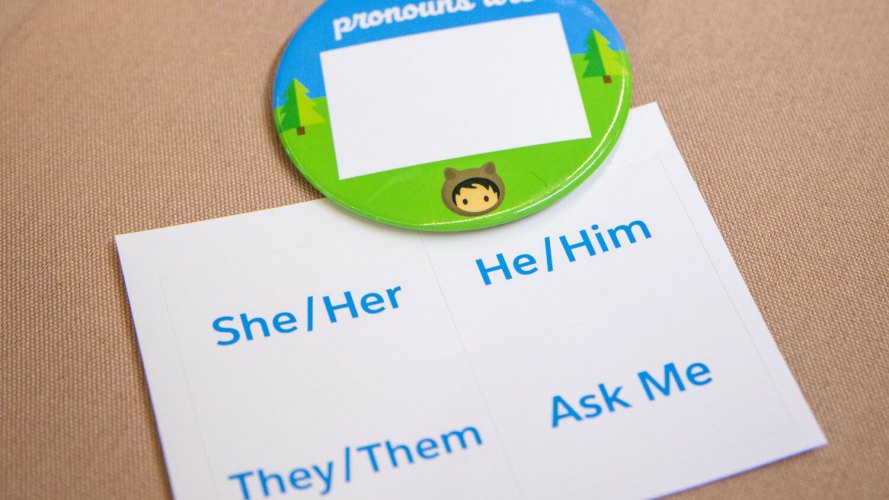Every third Wednesday in October, we honor International Pronouns Day. At Salesforce, we are committed to making sure everyone is included — asking, respecting, and affirming one another’s pronouns is an important part of the employee experience.
What are personal pronouns?
Personal pronouns are words used instead of a person’s name and often refer to a person’s gender identity. The use of pronouns is so frequently used in our everyday conversations that it may be easy to make assumptions rooted in our own unconscious biases.
Misgendering or misusing a person’s pronouns can cause trauma, dysphoria, increased anxiety, stigmatization, and many other challenging emotions to the transgender, gender non-binary (GNB), and gender nonconforming (GNC) community. By being aware of all pronouns and more intentional about the way we use them, we can foster a more positive and inclusive environment.
Below are some examples of personal pronouns, when referring to others:
- She/her: often refers to women
- He/him: often refers to men
- They/them: often refers to both plural for groups of people and gender nonbinary/nonconforming individuals
- Ze/zir: often considered gender fluid. A person who goes by “ze” could actually be a man, a woman, both, neither, or something else entirely
The importance of Inclusion
LGBTQ+ inclusion is a business imperative. Research demonstrates that LGBTQ+ inclusive workplaces have higher performance, productivity, retention, and well-being. In today’s global society, gender identities are more fluid than ever. In fact, studies recently found that one in five adults in the U.S. knows someone who uses gender neutral pronouns, and another survey found 74% of respondents agree that employers should learn and use their employees’ pronouns in the workplace.
“Sharing pronouns should be normalized, especially in the workplace. It signals acceptance and cultivates an inclusive environment. In my journey to being an ally, I learned to start meetings by sharing my name, title, and pronouns. This encourages our employees of all gender identities to feel welcome, respected, and included,” said Molly Q. Ford, vice president, Global Equality Programs.
The use of correct personal pronouns extends far beyond LGBTQ+ inclusion; it is a vital part of building an inclusive culture. For example, respectfully introducing individuals with their correct pronouns is crucial for the customer who happens to be a cisgender man, but is regularly misgendered over the phone because of his gender ambiguous name. Being able to address your colleagues, leaders, and customers with their correct personal pronouns demonstrates respect, intention, and inclusion.
Here are five personal pronoun best practices to be an active ally
A critical part of Salesforce’s path towards Equality for All is allyship. As active allies, here are 5 tips on how to incorporate personal pronouns into your everyday language:
- Introduce yourself with your pronouns
Add pronouns in your introduction slides to accompany your name and job title. When introducing yourself, share your pronouns as well. This sets an inclusive tone from the start.
- Ask, “What are your pronouns?”
Asking for others to share their pronouns at the start of a conversation or meeting ensures you will use the correct pronoun they personally identify with. This not only provides a sense of inclusion for all gender identities, it also avoids misgendering anyone throughout the duration of your interaction.
Please note that sharing pronouns is optional and voluntary — not to be forced, mandated, or mandatory by any means. If someone is not ready or comfortable sharing their pronouns, just use their name.
- Add pronouns to your email signature, business card, social media profiles, etcetera.
This is a great way to normalize pronoun sharing and to proactively make your pronouns known to others.
For example, if you send an email to someone with an androgynous name, or perhaps from a country with names you are unfamiliar with, you can find their pronouns in their email signature to correctly refer to them throughout your correspondence.
- Respect and practice using pronouns you may not have much experience incorporating into your vocabulary.
Language is fluid and ever evolving. If you don’t have experience using gender-neutral pronouns yet, it may not seem grammatically correct. However, it’s important to remember that the priority here is to be as inclusive as possible.
One recommendation to start incorporating more gender-inclusive language would be to avoid using words and phrases such as “hey guys, “ladies and gentlemen,” “sir,” “ma’am” — unless someone specifically asks you to refer to them as such — as these often assume gender. Instead, incorporate a gender inclusive pronoun such as “they” instead of “he” or “she” to address an individual or group.
- If you make a mistake and misgender someone, or refer to them with the wrong pronouns, apologize and take accountability.
If someone corrects you, thank them and be grateful for their active allyship. Do not make it about yourself or dwell for a long time — move forward. We are all on a journey of unlearning and becoming more aware of our unconscious biases, it takes time and practice. Be patient, be humble, and do your best.
What next?
Together, we can reach equality in the workplace and build an industry that truly reflects the diverse communities around us. Let’s do our part in building an inclusive workplace by using pronouns and leading with inclusive language. At Salesforce, we are committed to advancing gender equality in the workplace and in society. If you’re interested in a career at Salesforce, visit our careers page.




![[Customer service career path]: A picture of Shonnah Hughes smiling in her maroon Serviceblazer hoodie](https://www.salesforce.com/blog/wp-content/uploads/sites/2/2024/06/Serviceblazer-Shonnah-Hughes.jpg?w=128&h=96&crop=1&quality=75)























